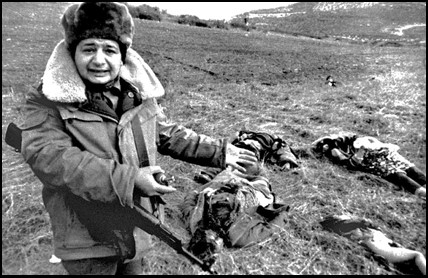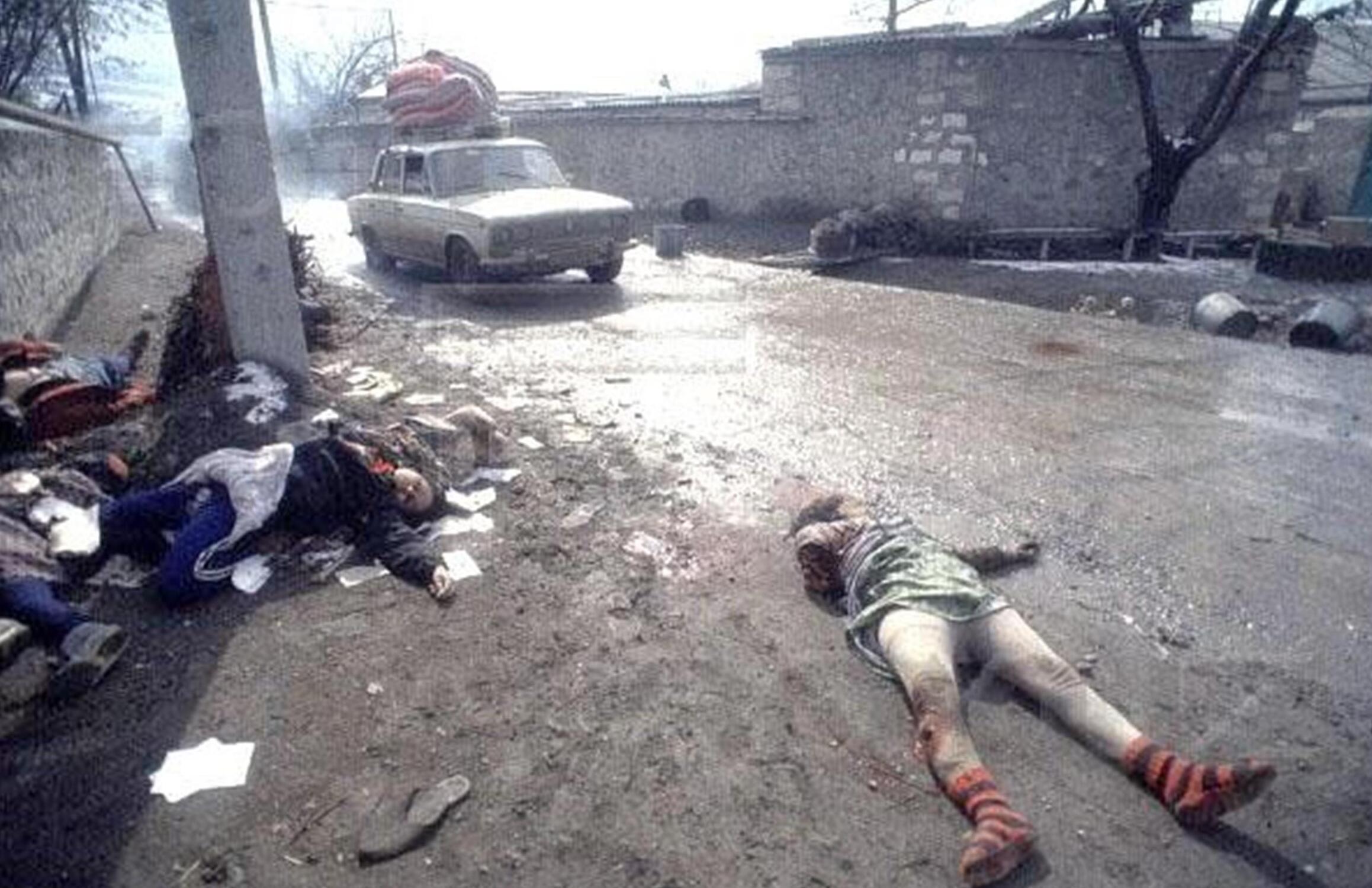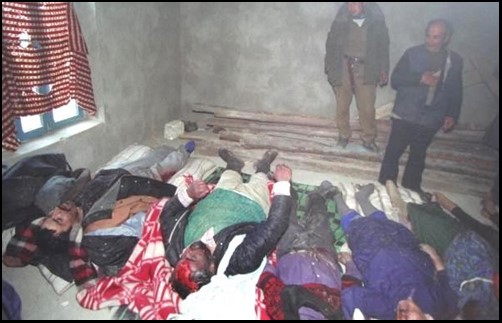Khojaly Genocide
One of the most tragic and unprecedented events in history in the course of the Nagorno-Karabakh conflict, which arose in February 1988, as a result of the groundless territorial claims made by Armenia against Azerbaijan, was the genocide that took place in Khojaly, one of the oldest human settlements in Karabakh. 
Khojaly is situated 14 km northeast from the city of Khankendi. Khojaly had been under blockade since October 1991. The city had suffered a power cut since January 2, 1992. Helicopters were the only means of transportation. The last helicopter arrived in Khojaly on January 28, 1992. This connection was also cut off after a civilian helicopter was shot down in the sky of Shusha city and 40 people were killed as a result. The defense of the city was mainly organized by the local self-defense units armed with small arms, the militia and the soldiers of the National Army.
Starting from the second half of February, Khojaly was besieged by Armenian armed groups and every day it was subjected to artillery fire, heavy military equipment, and attacks by Armenian armed units. Any attempts by local civilians to break the siege were prevented.
At the beginning of 1992, 7,000 people lived in Khojaly, which was given city status. During the period of infamous events, many Azerbaijanis displaced by Armenians from their historical and ethnic lands in Armenia, from neighboring Khankendi, and Akhiska Turks (also referred to as Meskhetian Turks), expelled from the Fergana region of Uzbekistan in 1989, also settled there.
 On the night of 25-26 February 1992, in violation of all international legal norms, Armenian armed forces attacked the civilian population of the sieged town of Khojaly with heavy military equipment, with assistance of the 366th motor rifle regiment of the former USSR deployed in the city of Khankendi killing them with unprecedented brutality and razing the town to the ground. On that bloody day Khojaly was attacked from 11 directions at around 23.00 p.m. First, Khojaly was surrounded by Armenian troops from all sides, then the city was flattened by heavy artillery bombardments. In a short time, a fire broke out in the city and it was completely engulfed in flames. The population, cut off from the outside world, whose strength was limited to the shotguns of the self-defense groups, was unable to resist the regular Russian army and frenzied Armenian killers. The defenders of the city and the local population were forced to withdraw. The people of Khojaly faced gruesome atrocity. During this genocidal operation, military equipment of the former USSR Ministry of Defense, shells containing toxic chemicals, prohibited "round" bullets, and other weapons were used. The city was occupied by Armenian invaders until 5 a.m. on February 26. Ancient Khojaly was razed to the ground in one night.
On the night of 25-26 February 1992, in violation of all international legal norms, Armenian armed forces attacked the civilian population of the sieged town of Khojaly with heavy military equipment, with assistance of the 366th motor rifle regiment of the former USSR deployed in the city of Khankendi killing them with unprecedented brutality and razing the town to the ground. On that bloody day Khojaly was attacked from 11 directions at around 23.00 p.m. First, Khojaly was surrounded by Armenian troops from all sides, then the city was flattened by heavy artillery bombardments. In a short time, a fire broke out in the city and it was completely engulfed in flames. The population, cut off from the outside world, whose strength was limited to the shotguns of the self-defense groups, was unable to resist the regular Russian army and frenzied Armenian killers. The defenders of the city and the local population were forced to withdraw. The people of Khojaly faced gruesome atrocity. During this genocidal operation, military equipment of the former USSR Ministry of Defense, shells containing toxic chemicals, prohibited "round" bullets, and other weapons were used. The city was occupied by Armenian invaders until 5 a.m. on February 26. Ancient Khojaly was razed to the ground in one night.
As a result of the Khojaly genocide, 5379 residents of the city were forcibly expelled, 1275 people were captured and taken hostage (the fate of 150 of them, including 68 women and 26 children, is unknown to this day), 487 people suffered various degrees of physical injuries, 8 families were completely annihilated, 27 families had only one surviving member, 130 children lost one parent, 25 children lost both parents, 613 people, including 63 children, 106 women and 70 elderly died under torture.
56 people were killed with extreme cruelty and without mercy. They were burnt alive, decapitated, their faces and scalps peeled off, the eyes of babies were gouged out, and the stomachs of pregnant women were thrust with bayonets. Armenians even insulted the corpses.
The legal and political assessment of the Khojaly genocide was given for the first time during presidency of the national leader Heydar Aliyev. On his initiative, on February 24, 1994, the Milli Majlis (Parliament) adopted a resolution on " Day of Khojaly Genocide ". On March 1, 1994, the national leader signed a decree on the Khojaly Genocide. Later, by the decision of the Milli Majlis, February 26 was declared "Day of Khojaly Genocide and National Mourning". On February 25, 1997, a Decree was signed by the national leader Heydar Aliyev "On announcement of a minute of silence in memory of the victims of Khojaly Genocide".
Increasing the international community’s awareness of the truth about the Khojaly Genocide is always one of the important directions of President Ilham Aliyev's political activity. Mehriban Aliyeva, the First Vice-President of Azerbaijan, President of the Heydar Aliyev Foundation, also has exceptional services in calling the world attention to this dreadful genocide. "Justice for Khojaly!" campaign of Foundation annually commemorates the victims of the Khojaly Genocide in many countries. It is a genocide not only against Azerbaijanis, but also against humanity as a whole. As a result of the activity of the "Justice for Khojaly!" campaign, 17 countries of the world, 24 states of the USA and the Organization of Islamic Cooperation adopted resolutions recognizing the crimes committed by Armenians against Azerbaijanis in Khojaly as genocide.
The Khojaly genocide is one of the most horrific crimes committed against humanity in the 20th century due to its scale, cruelty and inhuman methods of warfare.
Recommended literature:
- Xocalı Soyqırımı - 1992 : sənədlərdə, faktlarda və xarici mətbuatda = Khojaly Genocide - 1992 : in documents, facts and foreign press = Ходжалинский Геноцид - 1992 : в документах, фактах и зарубежной прессе / Azərbaycanda Vətəndaş Cəmiyyətinin İnkişafına Yardım Assosiasiyası ; baş red. A. Şərifov. - Bakı : Əbilov, Zeynalov və oğulları, 2006. - 582 s.
- Xocalı soyqırımı: milyon imza - bir tələb = Khojaly genocide : million signatures - one demand = Ходжалинский геноцид : миллион подписей - одно требование / Azərbaycanda Vətəndaş Cəmiyyətinin İnkişafına Yardım Assosiasiyası ; layihənin rəh., ön sözün müəl. E. Süleymanov, baş red. V. Əlibəyov. - Bakı : Əbilov, Zeynalov və oğulları, 2007. - 536 s
- Paşayeva, Qənirə Ələsgər qızı. Xocalı soyqırımı : şahidlərin dilindən / Q. Ə. Paşayeva, H. İ. Məmmədova ; red. Ə. M. Yolçuyev. - Bakı : Elm və təhsil, 2011. - 288 s.
- Xocalı - XX əsrin soyqırımı = Khojaly - Genocide of the 20th Century = Ходжалы - геноцид XX века = Chodschali - Völkermord des XX. Jahrhunderts = Khodjaly - Génocide du XXe siècle / Azərbaycan Respublikası Prezidentinin Administrasiyasının İctimai-siyasi məsələlər şöbəsi, AzərTAc ; tərt.: Ə. Mehdiyev, V. Əliyev, D. M. İsmayılov ; layihənin rəh. Ə. Həsənov. - Bakı : Şərq-Qərb, 2012. - 131 s.
- Церцвадзе, Феликс Эрастович. Забытый геноцид / Ф. Э. Церцвадзе. - Нью-Йорк : [б. и.], 2005. - 132 с.
- Исторические факты о деяниях армян на Азербайджанской земле: сборник = Historical Facts of Armenia’s Actions in Azerbaijan Land : collection / Я. М. Махмудов [и др.] ; науч. ред. Я. М. Махмудов, ред.-сост.: Т. А. Мусаева, А. Мамедов ; Институт Истории им. А.А. Бакиханова НАНА. - Баку : Тахсил, 2009. - 432 с.
- Tsertisivadze, Felix. The forgotten genocide / F. Tsertisivadze ; trans. N. A. Ohotin. - New York : [w. p.], 2005. - 128 p.
- Khojaly Tragedy: history, facts, international press & documents / trans. J. Novruzov ; comp. T. Bagiyev. - Baku : [w. p.], 2003. - 48 p.
- Mammadova, Havva. Khodjaly: martyrs and witnesses : armenian terrorism as an integral part of the international one / H. Mammadova ; trans. J. A. Aliyev ; ed. V. N. Rahimova. - Baku : House of Tales, 2006. - 248 p.
- Historical Facts of Armenia’s Actions in Azerbaijan Land: collection / Y. M. Mahmudov [et al.] ; trans. S. Almammadova ; scien. ed. Y. M. Mahmudov ; ed., comp.: T. H. Musayeva, A. Mammadov ; Institute of History named after Abbasgulu Agha Bakikhanov of the ANAS. - Baku : Tahsil, 2009. - 208 p.